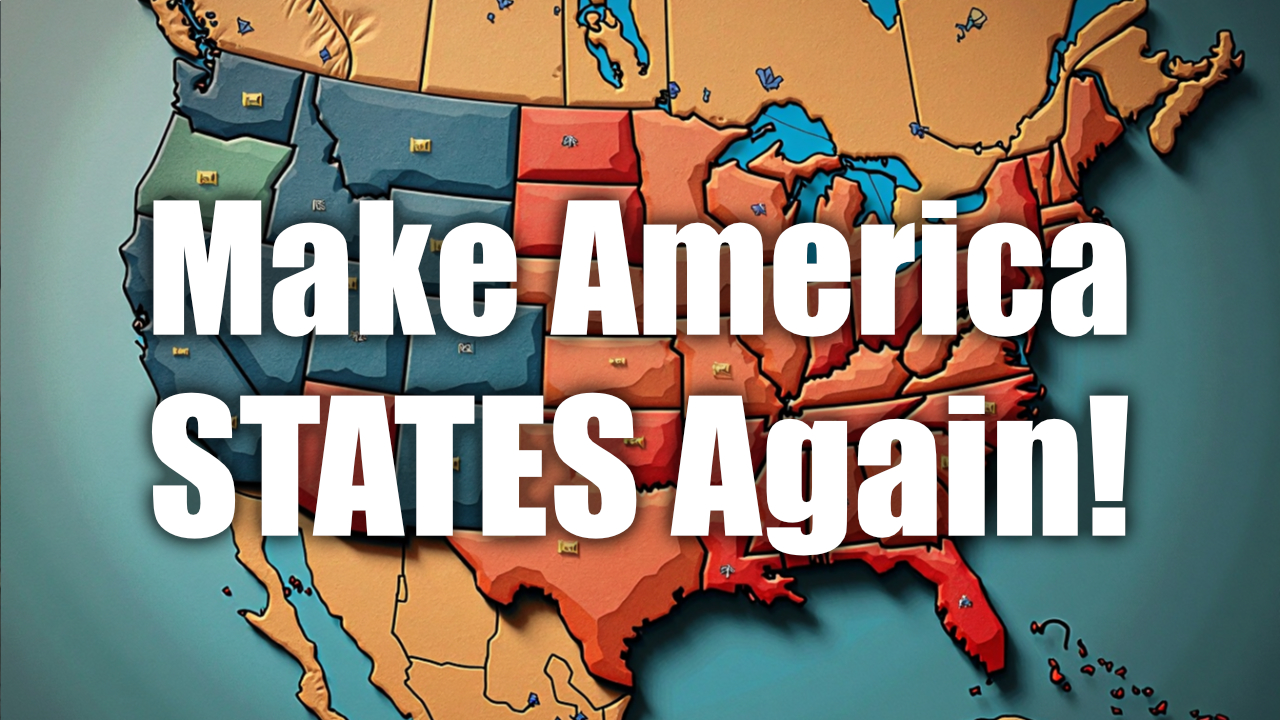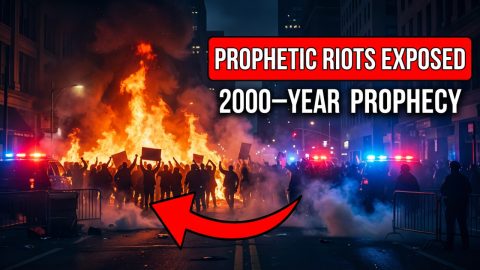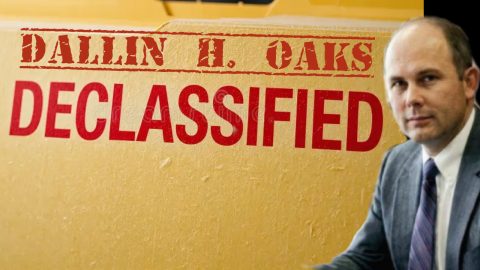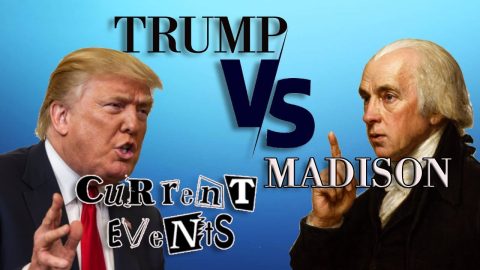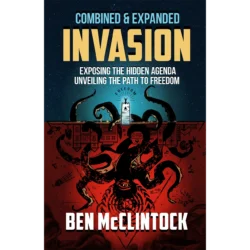Ben McClintock was a keynote speaker at the 2025 Constitution Party Convention in Orem, Utah. His topic was the power of states and individuals to take a stand against unconstitutional federal overreach. Due to video equipment failure at the actual event, this speech was re-recorded at another location afterwards. Get the book the powers that shouldn’t be are afraid for you to read at https://treeoflibertysociety.com/invasionbook/.
Help support ad-free content with a one time donation or becoming a member today.
Thank you to our sponsors
https://connollyandsonsconcrete.com/
https://www.dentistry4health.org
http://www.highercallingfirearms.com
http://www.americanappliancehvac.com
https://insurewithcompass.com/sbarlow.html
TRANSCRIPT
When we talk about the Constitution, sometimes we forget about the basics, the fundamentals, the natural law, and then also what created the Constitution.
The fact that it’s not just this thing that existed and then created all these sub-bodies, but actually that it was 13 independent nations that formed a union.
And what that really means.
And so what we have to understand about the Constitution is that it’s a contract between these independent nations.
And the Founding Fathers talked about the fact that this is a contract.
We have here Thomas Jefferson, where he talks about that.
This isn’t the Kentucky Resolution.
So the state of Kentucky was saying that an act of the federal government was illegal.
And so Thomas Jefferson being one of the authors of that said that the several states composing the United States of America are not united on the principle of unlimited submission to their general government.
But by a compact under the style and title of a constitution for the United States and of amendments there too, they constituted a general government for special purposes.
So it’s a compact.
What does that mean a compact?
Let’s go into Article 7 of the Constitution.
The compact is a formal agreement or contract.
So we have entered into by the states a contract to have specific limited duties performed.
And so in Article 7 of the Constitution we learn more about the application of that contract.
It says the ratification of the conventions of the nine states shall be sufficient for the establishment of this Constitution between the states so ratifying the same.
So this Constitution is between those states.
They needed to have a certain amount of states saying we’re going to agree to this contract before it was binding upon those that did enter into it and then it was between those states.
It wasn’t between this all-powerful body and these sub -bodies that were subject to the bigger body, but it was another body that was created by these, and it was something between the states specifically.
And then we go to the next article in the Constitution.
We have the 10th Amendment, where it explains this concept of a compact even more in the contract, says the powers not delegated to the United States by the Constitution, nor prohibited by it to the states, are reserved to the states respectively or to the people.
So once again saying that this contract is a limited contract whether we have given limited powers to this new body that we have created and that if we haven’t given that body powers then that body doesn’t have that power specifically and then that those powers are then of course reserved by the creators the states and or the people themselves.
So again, the contract and the Kentucky Resolution, Thomas Jefferson says, “The several states who formed that instrument “mean the Constitution, being sovereign and independent.”
So even at this point, we formed the Constitution and we have created this compact, this contract, and we were still considered sovereign and independent nations.
Have the unquestionable right to judge of its infraction and that a nullification by those sovereignties of all unauthorized acts done under the color of that instrument is the rightful remedy.
So he’s saying that, no, it’s not the judges, it’s not the Supreme Court that decides when the Constitution is violated, it is the states, it’s the creators of the compact, of the contract that are the ones that are the final arbiters of when something is constitutional or when it goes beyond those bounds.
And we’re gonna get into a little bit some more modern application of that, and so that it kind of helps us to really quantify it and make it make more sense when we get to that.
But let’s go to the next part of the, this is in the ratifying convention.
The father of the Constitution, James Madison, explained this contract nature saying that clearly, according to the expositors of the law of nations, that a breach of any one article by any one party leaves all other parties at liberty to consider the whole convention to be dissolved, unless they choose rather to compel the delinquent party to repair their breach.
So when you have a contract between two parties and one of the parties violates that contract, you have one of two options.
You have either saying, “Okay, that contract’s null and void, we’re not going by it anymore, we’re separating our ways,” or you say I’m going to force you to be a party to the contract. I’m going to force you to obey the contract that we both agreed to go by.
Those are our two options.
We either separate ourselves or we enforce the document.
There’s no other option when you have a party violating the contract.
And then again is in the Virginia resolution that came out about the same time as the Kentucky resolution, nullifying an act of the federal government.
James Madison said that this assembly doth explicitly and peremptorily declare that it views the powers of the federal government as resulting from the compact to which the states are parties, as limited by the plain sense and intention of the instrument constituting the compact, as no further valid that they are authorized by the grants enumerated in that compact.
So in layman’s terms, that it is clear there is nothing that the federal government has the power to do that isn’t specifically listed as a power to do and that it is a
plain sense, the intention of the contract is no further valid than when they obey the limited jurisdiction that is given within that document.
And what’s really important to understand about James Madison is he was what’s called a federalist.
He was in support of the union.
It wasn’t like he was Thomas Jefferson Thomas Jefferson was considered a anti-Federalist where he thought that the Constitution gave this new general government too much power.
So you can imagine somebody that was against the Constitution to begin with would say, “Oh, I’m gonna find a reason why it’s no longer valid.”
No, we have James Madison, the father of the Constitution, saying, “When you go beyond these bounds, “you are violating the contract that we entered into.”
And so they actually said in the Virginia Resolution, resolution was their duty to preserve the union was to enforce the contract by disobeying actions that
violated the Constitution and so it was their effort to be able to preserve the union that they said no we’re not going to obey the federal government so now we
have the law of agency and what that means in contract so we have this gentleman here and we have a contractor we have a homeowner and we have a home builder or a landowner and a home builder.
And they get together and they enter into a contract.
They agree together that I’m going to give you a certain amount of money and you’re going to build this house the way I’ve asked you to build it.
And so they agree to it.
They enter a contract.
And if the builder does what he’s told, exactly how he’s told, then he’s due the money that was agreed to in advance.
But let’s say the contractor says, you know what, this family could really use a pool. You know, they’ve got kids before their general welfare of their family.
So I’m going to add a pool to this.
And of course, because I spent the money, I spent the time for the equipment and the materials, he owes me to build this pool. But that’s a violation of the contract.
Because what was he given the authority to do? Only to build the house, nothing more.
And so any reasonable judge that this was brought to, if The contractor goes together, goes to court and says you owe me money for the pool.
The judge is going to say no, that contract was null and void when you built the pool, when you were not authorized to build the pool.
And so any, I think reasonable person would say this makes sense.
All of a sudden when we apply this to the Constitution, people think that that’s radical.
You know, that might be extreme.
But that’s exactly what it is.
It’s a contract between these parties and they have agreed to do certain things and if they do those certain things, the parties involved have agreed to go along with it, but as soon as they go beyond, as soon as they build that pool, no longer obligated to obey any of the actions, any of the laws that were passed by the body that was only authorized to do certain things.
So the thing to do is to fire the contractor.
So article five, talking about preserving the contract, because who created the contract again?
It was the states they came together and they said we agree to delegate these certain things so they’ve come together so article five of the Constitution is what was added to the contract to allow the states to be able to preserve their power and so as we go through it’s preserving their voice we look at what it says so
protecting the voice of the states it says that no state without its consent shall it be deprived of its equal suffrage in the Senate.
So the state, as a political body, cannot, without its permission, have its suffrage.
If you remember the suffrage for women, right? So suffrage means votes.
So the state government’s vote cannot be taken from it without its consent, meaning without its permission.
So why did they do that?
They called it the unamendable laws because they couldn’t have their vote taken away without their consent.
You couldn’t have 99 out of 100 say that you don’t get your vote anymore.
They had to have everybody say yes, you can take away my vote, okay, so it was unamendable.
So we look at the Electoral College, just kind of the same principle behind giving the states their vote is the same concept behind the Electoral College, why we don’t actually pick a president according to the the popular vote.
You can just imagine what that would look like as we have these major population areas of California, of New York, and what that means.
You have the California having almost 40 million people in it and you have New York having about 20 million people in it and then you have states like Alaska and South Dakota having less than a million people in each of those states and what kind of result that that has what that would have if it was simply done by the population if we chose president by population you would have one or you know three or four cities basically picking the president and the rest of the country would be out of it and so they gave us the Electoral College to make sure that the president was chosen by the states as opposed to one or two major cities across the Union.
And so we look at article five again that protects the voice of the states and we look at this, you know.
The city of Los Angeles with all by itself.
We have it having about 12 million people versus the entire state of Utah only having about four million.
So just the city of Los Angeles would outvote us, you know, according to the presidency What is that three times over and so the just the influence that we would lose, that all of the smaller states would lose, was in the founding fathers wanted to prevent.
And so as another check besides the electoral college, we have article five of the constitution, not having their votes taken away from them.
And so here, and we look at the state of Utah and the counties within our state, where if the state had its vote taken away from it, and it was given to the people, like they choose the congressman, You have basically Utah County and Salt Lake County having all of the voice in who the senator is for the state of Utah.
And so the founding fathers recognized that just like that’s a problem for the entire union, a state would have its voice taken away if it was chosen by population just as much as if the president was chosen by population.
And so they in the article 5 of the Constitution made sure that the states got to keep their vote, and it was the state legislators that picked the senator for the U .S. Senate.
And so they called it the Unamendable Clause.
We have in the convention of 1887, it says it was feared that three -fourths of the states might be brought to do things fatal to particular states, as abolishing them altogether or depriving them of their equality in the Senate.
To protect this, it was added that no state be deprived of its equality in the Senate.
So no state was to have its vote taken away from them.
In the convention they also said that, in an order that no consolidation should take place, it is provided that no state shall by any amendment or alteration be ever deprived of an equal suffrage in the Senate without its own consent.
So there’s no, you can’t have an amendment passed unless it was Every single state said, “Yes, I agree to this.”
It’s not like any other amendment where you just had three -fourths of the states say that they agreed to it.
Had to be every single state agree to have its vote taken away from it.
And so we have the 17th Amendment, though.
That was passed in 1913, and it says, “The Senate of the United States shall be composed of two senators from each state elected by the people thereof.”
So it took away the vote of the states.
It said, “Now we’re going to give it to the people, the population centers of that state.”
an opinion on it.
So if a state has to have its consent to have its vote taken away from it, is the 17th Amendment valid according to Article 5 of the Constitution?
No, absolutely not, because they did not give their assent to have their voice taken away from them.
And so we have the state of Utah, in fact, went a step further and not only didn’t give its permission, but the state of Utah said, “No, you can’t have our vote.”
And so according to Article 5 of the Constitution, the 17th Amendment is a violation of the Constitution, which I think sounds weird to a lot of people to say that the Constitution violates the Constitution, but when you’re going to change it, you have to follow the rules of the original contract, otherwise the contract is now null and void.
So you have two options, right?
We have one option is to cancel the contract as it’s been violated or you enforce it as the contract has been violated.
And what needs to be understood is that it was not us that violated the contract.
It was the the general government that violated the contract by forcing a violation of it.
So what can a state do now that it’s been supposedly passed?
Do we do we just have to capitulate and go along with it?
You know, right?
No.
You don’t have to just go along with it.
That’s what the founding fathers said with the Kentucky and Virginia resolutions and other examples of nullification.
You just say, “No, we’re not going to go along with it. It’s not a violation of the contract, and so it’s null and void, and we’re just not going to
do it.”
But there are other options that you don’t have to leave the union, that you can actually start to enforce the Constitution, and that is another option that
can be done.
We’ll get into that.
So what a state can do, you have James Madison in Federalist 46.
What he said, this is an argument you had, Patrick was also what was considered an anti -Federalist, saying we were giving too much power to the general government.
And you had James Madison, the Federalist Papers, defending the Constitution, saying, no, we would never, we would have to be insane.
He says, what degree of madness would we have to have come to to allow the general government to be so powerful that it takes away the state’s rights?
And so he says, so in Federalist 46, he goes through when he lists the things that can be done for an individual state to withstand the unconstitutional actions of the federal government.
He says that the means of opposition to the federal government going beyond its bounds are powerful and at hand.
So he’s like, it shouldn’t be a difficult thing.
These tools that we have, they are powerful tools and they’re right next to us.
We can grab them any time we want to. He says the disquietude of the people, their repugnance, and perhaps refusal to cooperate with the officers of the Union,
the frowns of the executive magistrate, the magistracy of the state, the embarrassment created by legislative devices, which would often be added on such occasions would oppose in any state difficulties not to be despised.
A correspondence would be opened, Plans of resistance would be concerted.
In the contest with Great Britain, one part of the empire was employed against the other.
The more numerous part invaded the rights of the less numerous part.
So he’s going back to the war for independence that we just went through and saying, we had a much bigger organization coming against us.
And then he’s saying now that no, we have a much bigger thing.
He is what would be the contest in the case we are supposing?
Who would be the parties?
A few representatives of the people would be opposed to the people themselves.
So he’s saying it would be the exact opposite.
So it’d be much easier because we’d have more people opposing a smaller group of people.
And so it would be much easier for us to oppose the government if they went beyond its bounds in the Constitution in this scenario.
So I wanna break this down also into more modern tongues.
We can, you know, disquietude is not really a word that’s used very often today, at least in the circles I run around with, or, you know, repugnance, I think that the meaning of that has changed a little bit as well.
So I wanna just talk about those meanings and that’ll help us to understand what it is our duty is or what are the things that we can do when the government goes beyond its contract.
So talking about disquietude, oh I’m sorry, with this just kind of breaking down what it is that James Madison said in Federalist 46, he says, “The disquietude of the people, the people’s repugnance, and the refusal to cooperate with the officers of the union.”
So these are the tools that we have at hand to be able to resist when the contract is being violated.
So now we look at the definitions of these words, disquietude.
We go to the dictionary of the time, Samuel Johnson’s dictionary, that was what the founding fathers would have used, and it says that it’s uneasy, uneasiness, anxiety, disturbance, wanted tranquility, so essentially no peace until the tyrants retreat.
So that’s what we’re supposed to do, according to James Madison, is that we are to have no peace.
We are to be full of disturbances and wanted tranquility until they back off, so that’s what disquietude We are going to be constantly going after them.
Somebody talks about one topic, and we just bring it right back.
We say, no, we’re talking about the violation of the contract. And then something else comes up again.
We’re like, no, we’re talking about the violation of the contract.
How about repugnance?
Today, the word means, in most people’s minds, at least in my mind, it’s ugly, it’s gross.
But that’s not what he meant there in the context of ’46. In federalist ’46, Disquietude means something completely different, but I am getting ahead of myself again, and I’m gonna get some more background on how the Founding Fathers were full of disquietude, how they were full of disturbances leading up to the War for Independence.
We have a 10 -year period, 1766 to 1776, there were more than 70 recorded incidents of tarring and feathering by colonists against government officials, just right there.
Today, can you imagine the way that our population is today?
If a single politician was tartan feathered by the populace, what would the response be, right?
The founding fathers were of a different breed than we are today.
They went, they’d 70 in 10 years.
In Berkshire, colonists forced justices of the court from their seats, shut up the courthouse and forced the justices from the city.
So they just ran everybody out of town that was going to be forcing the tyrannical acts of the crown.
Another thing that they did, they said outside of Boston, colonists went to the home of another judge and fired shots into his house, forcing him out of the city.
So again, you can just imagine what that would be like today because of the way that our culture is, that this would be seen as unacceptable.
But the founding fathers said, no, this is how we behave to be able to get government back under control.
This is something that most people in America believe that they support the Founding Fathers.
They love what the colonists did to be able to gather independence.
But when we say let’s be like them, they’re like, wait, hold on a second, that’s a little extreme to be like the Founding Fathers as much as we like to respect them.
But this is what they said was the solution to an out of control government.
Again, in 1774, the Attorney General’s House had windows broken and other damage forcing him to flee the city to Cambridge, Massachusetts, Lieutenant Governor had his house ransacked by colonists and was forced to resign and flee to Boston for safety. 5 ,000 colonists went to Worcester and compelled the judges, the sheriff, and other judicial officials to promise not to hold courts enforcing the acts of parliament.
So again, they were full of disquietude.
They did not allow the government to enforce its tyrannical edicts.
They said, “No, we’re not going to do it, and if you’re gonna be a part of that, we’re gonna drive you out of town.”
So, it’s our godly duty to be full of disquieting. The scriptures talk about that in Proverbs.
We’re to open in thy mouth for the dumb in the cause of all such as are appointed to destruction.
Open thy mouth, judge righteously, and plead the cause of the poor and needy.
And then in the Doctrine and Covenants, section 3, the Lord says, “Also, it is an imperative duty that we owe to all the rising generation and all the pure in heart
that we should waste and wear out our lives and bring into light all the hidden things of darkness wherein we know them.”
So we’re told to be full of disquietedness.
We’re supposed to waste and wear out our lives in exposing what’s going on. Lord says that we’re wearing out our life.
Like when we wear out something, it’s something that is used up is it’s not hidden away, something that is regularly used.
And so we are told to be full of disquietude to expose the evil that is going on and so that good may prevail.
So go to repugnance, what we think today and what it was back then. Repugnance was just disobedient. Wasn’t something that was stinky or ugly.
If you were repugnant, it meant that you were going to resist what was going on.
You just don’t do it.
And that’s what the founding fathers said under the Kentucky resolutions and in the Virginia resolutions and other examples of when the federal government violated the contract they said we’re not going to do it we’re not going to obey and that’s our job to preserve the union preserve the contract was to not obey anything that was outside of the contract so we’re supposed to be disquietful of disquietude and repugnance and so we do that through passing out literature or having cottage meetings in our home where people present something.
We pass out books to help people understand what’s going on.
We go to a meeting, a public meeting of a public official, and we get in their face and we say, you’re violating the contract.
You’re breaking the law. You need to be called out on it specifically, also getting together with those that we know and just meeting with them one -on -one and sharing with them the facts of liberty, of what God has asked us to do, and what is being violated in those things and so that we can bring more people to an understanding of their duty to be full of disquietude and repugnant.
So an example that he said, he says, “We need to refuse to cooperate with the officers.”
Here’s some examples of officers, right?
We have IRS agents, you have OSHA agents, you have ATF agents, and even local police would be considered the officers of the government because, A, of course, they are enforcing the tyranny and they are funded by the federal government.
And so, they are considered officers of the federal government that you would not cooperate with when they are sent to enforce these illegal edicts that violate the contract.
So I want to be more general, right? Just like when we say that we shouldn’t obey things that violate the contract, doesn’t mean we can just go down I -15 and do a bunch of donuts.
We don’t just break the law just because the government said you should do it, right?
There’s wisdom in things that you do.
And so we don’t, just because a government agent wants to ask for your help in finding out what’s going on with something, then we have to say, “Okay, this is reasonable.”
If somebody has actually murdered someone, then we should help catch the murder because murder is wrong.
But we see these agencies, they are illegal, they shouldn’t exist in the first place, and so we don’t cooperate with an agent of an agency that is illegal in the first place, but let’s give some specific examples of what I mean of not cooperating, refusing to cooperating with the officers.
We have here, I don’t know if you guys remember, this was back in 2003, here in Utah, you had a 12 -year -old that was diagnosed with cancer, and his parents didn’t wanna give him chemotherapy treatment, but that was illegal in the state of Utah.
You are compelled to treat your minor with what the state says you must treat them with for that disease, and they didn’t want to do that, and so they fled the state.
They left to go to Idaho so that they could get the treatment that they wanted for their child instead of the one that the state wanted.
So if somebody came to me, I knew this family, and they wanted my help in finding them, I absolutely would refuse to cooperate with that officer.
Sometimes you see these Amber Alerts that come on your phone.
And we’ll see them pop up where that’s somebody where it’s just a specific example just happened last year where a mother and a daughter, which the grandma and then the daughter were gotten a fight.
The daughter left with her baby and the mom was scared and so called the police and the police issued an Amber Alert threatening to take away the child and put the mom in jail simply because of an argument.
Well, most of these cases that we see of these Amber Alerts are simply the government attempting to kidnap somebody’s child.
And so that’s an example of where I would refuse to cooperate with the officers.
Here’s another example that we see every once in a while.
We have FBI offering $25 ,000 rewards for information in a series of attacks against abortion clinics.
So just to translate, reproductive health service facilities means Baby Murder Clinics.
So am I going to help them out to get the $25 ,000 so that they can, you know, so what they’re saying is somebody did something to help protect babies from being tortured and murdered.
And now they want me to help them find that person and put them in jail.
I’m not going to do that.
I am not gonna cooperate with the officers of the government to put somebody in jail that did whatever they could to stop a baby from being tortured and murdered.
And so we see some examples and there’s probably an endless list of examples where we would say it’s not right to help out these officers and that we would say it’s morally reprehensible to help them out.
So just wanted to give those examples of what James Madison talked about in Federalist 46 when he talked about not cooperating with the officers.
When they’re violating the natural rights, when they’re violating the Constitution, it is our job to help enforce the Constitution by not cooperating with these officers.
So we are to be doers of the word, right, as the Apostle James says, not hearers, because when we only hear something and don’t do something, we are deceiving ourselves.
We are being slothful servants when we learn something and don’t apply it.
And so these are examples of things that we can do to apply the things that we’ve learned. We can be disquieted and repugnant, right?
We need to read and apply what we’ve learned, hold cottage meetings where you or a representative from the Tree of Liberty Society presents on a targeted message.
We can distribute books and pass along materials directing others to the truth.
We can attend meetings to expose publicly crimes committed by government officials or bring yourself and others to meetings others are organizing.
We can write articles or make videos or help produce videos on topics of liberty or exposing evil.
And we can join with others in the Tree of Liberty Society to increase the volume of our repugnance, the volume of our saying no, the volume of our being full of
disquietude.
Encourage those viewing this to join with us in the Tree of Liberty Society to do what the founding father said, to enforce the contract, to make sure that we are being full of disquietude and that we are being repugnant to the illegal and criminal acts of those that wish to rule over us and that we can be the worst global citizen that we can be.
Thank you.

